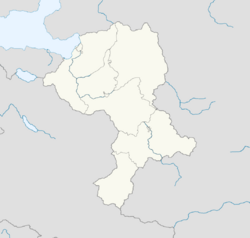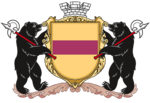Krovech: Difference between revisions
No edit summary |
No edit summary |
||
| Line 117: | Line 117: | ||
|footnotes = <!--For any generic non-numbered footnotes--> | |footnotes = <!--For any generic non-numbered footnotes--> | ||
}} | }} | ||
'''Krovech''' ({{wp|Serbian language|Krov}}: ''Кrovska''), officially the ''' Republic of Krovech''' (Krov: ''Republika Krovska'') is a {{wp|Sovereign state|sovereign state}} situated in northeast [[Asura]]. It is bordered by [[Elhazia]] to its west both sharing the Northern Sea to the north and borders [[Brilliania]] to the south. As of 2020 it is inhabited by nearly 11 million citizens. The most spoken and official langauge of Krovech is {{wp|Serbian language|Krov}} with 10 million speakers. Krovech is a {{wp|Unitary state|unitary}} {{wp|Parliamentary system|parliamentary}} {{wp|Republic|constitutional republic}}. The countries climate stays at a humid continental area with a subtle presence of a subarctic climate to the northwest. The capital and largest city of Krovech is [[Algrade]] | '''Krovech''' ({{wp|Serbian language|Krov}}: ''Кrovska''), officially the ''' Republic of Krovech''' (Krov: ''Republika Krovska'') is a {{wp|Sovereign state|sovereign state}} situated in northeast [[Asura]]. It is bordered by [[Elhazia]] to its west both sharing the Northern Sea to the north and borders [[Brilliania]] to the south. As of 2020 it is inhabited by nearly 11 million citizens. The most spoken and official langauge of Krovech is {{wp|Serbian language|Krov}} with 10 million speakers. Krovech is a {{wp|Unitary state|unitary}} {{wp|Parliamentary system|parliamentary}} {{wp|Republic|constitutional republic}}. The countries climate stays at a humid continental area with a subtle presence of a subarctic climate to the northwest. The capital and largest city of Krovech is [[Algrade]] out of the divided 8 districts of the nation with the cities of Boletck, Algrade, and Pirot with autonomous city authority. | ||
Before the creation of the Krov republic were a collection of {{wp|Petty kingdoms|divided kingdoms}} neighboring the smaller territories of modern day autonomous regions of Arstenska and Leckvoshev dated in the 14th century, the Krovs, consolidating for a greater king and forming a future short lived {{wp|Dual monarchy|dual monarchy}} with the Arstens had forged a maritime kingdom of commerce. For this consequences resulted in many moments in which the throne was contested many times notably the Kamenar War lasting from the late 14th century and into 1421 between the Arsten House of Inovo and the Krov House of Bortis which ended in a Bortis victory while the Arsten dynasty quickly became heirless and therefor was defunct. Later into the 15th century the terrain holding Leckvoshev was in constant skirmishes between the territory and the renamed House of Bortisborg until the 1446 Algrade Accord, capitulating Leckvoshev and ending the war. At the same time the pressure of the present [[Alydianism|Alydian]] crusaders the kingdom began to undergo conversion in many stages that finally reached completion when the ruler of the state, Marin the Great, was baptized in the coastal city of Algrade. Through the period of peace the areas of mostly Arstensk peoples had already been assimilated into Krovak culture, though still speaking the barely distinctive and nationally recognized minority language known today, in contrast Leckvoshev had clung onto their cultural heritage which would root the nationalist uprisings centuries later. | Before the creation of the Krov republic were a collection of {{wp|Petty kingdoms|divided kingdoms}} neighboring the smaller territories of modern day autonomous regions of Arstenska and Leckvoshev dated in the 14th century, the Krovs, consolidating for a greater king and forming a future short lived {{wp|Dual monarchy|dual monarchy}} with the Arstens had forged a maritime kingdom of commerce. For this consequences resulted in many moments in which the throne was contested many times notably the Kamenar War lasting from the late 14th century and into 1421 between the Arsten House of Inovo and the Krov House of Bortis which ended in a Bortis victory while the Arsten dynasty quickly became heirless and therefor was defunct. Later into the 15th century the terrain holding Leckvoshev was in constant skirmishes between the territory and the renamed House of Bortisborg until the 1446 Algrade Accord, capitulating Leckvoshev and ending the war. At the same time the pressure of the present [[Alydianism|Alydian]] crusaders the kingdom began to undergo conversion in many stages that finally reached completion when the ruler of the state, Marin the Great, was baptized in the coastal city of Algrade. Through the period of peace the areas of mostly Arstensk peoples had already been assimilated into Krovak culture, though still speaking the barely distinctive and nationally recognized minority language known today, in contrast Leckvoshev had clung onto their cultural heritage which would root the nationalist uprisings centuries later. | ||
Revision as of 22:07, 17 April 2020
Republic of Krovech Republika Krovska (Krov) | |
|---|---|
Motto: “Težimo za jedinstvo.” "Strive for unity." | |
 Map of Krovech including it's districts | |
| Capital and largest city | Algrade |
| Official languages | Krov |
| Recognised regional languages | Leckvo Brillian |
| Ethnic groups | Krov
Leckvo, Elhazian, Brillian |
| Religion | Alydianism |
| Demonym(s) | Krov |
| Government | Unitary parliamentary constitutional republic |
• President | Ivan Ambrozije |
• Prime Minister | Roman Stojan |
| Legislature | Parliament |
| Establishment | |
• Unification | 14th century |
• Treaty of Algrade | 1446 |
• Republic proclaimed | August 14th, 1888 |
• Current constitution | November 18th, 2002 |
| Population | |
• 2018 estimate | 10,830,588 |
| GDP (nominal) | estimate |
• Total | $160 billion |
• Per capita | $24,530 |
| Gini | 33.5 medium |
| HDI | 0.88 very high |
| Currency | Krov dinar (RKD) |
| Time zone | UTC +2.5 |
| Date format | dd ˘ mm ˘ yyyy |
| Driving side | right |
| Calling code | +46 |
| Internet TLD | .kr |
Krovech (Krov: Кrovska), officially the Republic of Krovech (Krov: Republika Krovska) is a sovereign state situated in northeast Asura. It is bordered by Elhazia to its west both sharing the Northern Sea to the north and borders Brilliania to the south. As of 2020 it is inhabited by nearly 11 million citizens. The most spoken and official langauge of Krovech is Krov with 10 million speakers. Krovech is a unitary parliamentary constitutional republic. The countries climate stays at a humid continental area with a subtle presence of a subarctic climate to the northwest. The capital and largest city of Krovech is Algrade out of the divided 8 districts of the nation with the cities of Boletck, Algrade, and Pirot with autonomous city authority.
Before the creation of the Krov republic were a collection of divided kingdoms neighboring the smaller territories of modern day autonomous regions of Arstenska and Leckvoshev dated in the 14th century, the Krovs, consolidating for a greater king and forming a future short lived dual monarchy with the Arstens had forged a maritime kingdom of commerce. For this consequences resulted in many moments in which the throne was contested many times notably the Kamenar War lasting from the late 14th century and into 1421 between the Arsten House of Inovo and the Krov House of Bortis which ended in a Bortis victory while the Arsten dynasty quickly became heirless and therefor was defunct. Later into the 15th century the terrain holding Leckvoshev was in constant skirmishes between the territory and the renamed House of Bortisborg until the 1446 Algrade Accord, capitulating Leckvoshev and ending the war. At the same time the pressure of the present Alydian crusaders the kingdom began to undergo conversion in many stages that finally reached completion when the ruler of the state, Marin the Great, was baptized in the coastal city of Algrade. Through the period of peace the areas of mostly Arstensk peoples had already been assimilated into Krovak culture, though still speaking the barely distinctive and nationally recognized minority language known today, in contrast Leckvoshev had clung onto their cultural heritage which would root the nationalist uprisings centuries later.
The kingdom underwent the ages of enlightenment where reforms opted to centralize the government, rename the monarch holder King of the Krovaks, abolish serfdom and establish a parliament in Algrade. Incompetence of the concurrent ruler Selkovic II in the 19th century would see many natural disasters and famines crippling the economic stability. The failure of the monarchist government created a bloody 2 year civil war which would result in the execution of the monarch and the creation of a parliamentary republic. The proclamation of the Republic of Krovech would see a convention to create a constitution and its elections between it's newly birthed parties. Following this Krovech would oversee the unfolding of both Great Wars while also dealing with internal issues regarding Leckvoshev opting for independence in return for helping the republican government during the civil war, creating a thought of revanchism until the late 20th and early 21st century where the country oversaw the ethnic nationalism in the streets of Pirot erupt into violence. Months into the culminating urban combat in Pirot tensions defused in peace agreements after it's autonomy and status was increased in the Boletck Concord in 2002.
Krovech has since regained its economic growth with its developed high income service and market based economy, the country is notable for it's historical and financial architecture in it's city centers and marginal though thriving agrarian foods and culture.
Etymology
The origins of the name Krovech comes from the Proto-Leonic word krȍv (roof) spelled in cyrillic кро̏в. The first usage of the word among many later variations can be traced by the settlements of Boletck by Early-Leonics later to be invaded by Krov's in the 1100's, adopted and used to encompass the conquered lands near the agrarian Arstensks.

